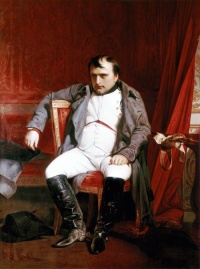Head of state
From The Art and Popular Culture Encyclopedia
| Revision as of 06:18, 14 April 2010 Jahsonic (Talk | contribs) ← Previous diff |
Current revision Jahsonic (Talk | contribs) |
||
| Line 1: | Line 1: | ||
| + | [[Image:Pyramid of Capitalist System.jpg|thumb|left|200px|''[[Pyramid of Capitalist System]]'', anonymous American cartoon (1911)]] | ||
| + | [[Image:Napoléon Bonaparte abdicated in Fontainebleau.jpg|thumb|right|200px|Napoleon was a [[Emperor of the French]] | ||
| + | <br>Illustration: ''[[Napoléon Bonaparte abdicated in Fontainebleau]]'' (1845) by Paul Delaroche]] | ||
| {{Template}} | {{Template}} | ||
| - | :"[[Louis XVI]], born '''Louis-Auguste de France''' ([[August 23]] [[1754]] – [[January 21]] [[1793]]) ruled as King of '''France'''. His execution signaled the end of [[absolute monarchy]] in France and would eventually bring about the rise of [[Napoleon I|Napoleon Bonaparte]]." | ||
| - | '''Absolute monarchy''' is a [[monarchy|monarchical]] [[form of government]] where the [[monarch]] exercises ultimate governing authority as [[head of state]] and [[head of government]], thus wielding [[political power]] over the [[sovereign state]] and its subject peoples. In an absolute monarchy, the transmission of power is two-fold, hereditary and marital; as absolute governor, the monarch’s authority is not legally bound or restricted by a [[constitution]]. | + | '''Head of state''' is the generic term for the individual or collective office that serves as the chief public representative of a [[monarchy]], [[republic]], [[federation]], [[commonwealth]] or other kind of [[Sovereign state|state]]. His or her role generally includes personifying the continuity and legitimacy of the state and exercising the political powers, functions and duties granted to the head of state in the country's [[constitution]] and laws. In [[nation states]] the head of state is often thought of as the official "leader" of the nation. |
| - | In theory, the absolute monarch exercises total power over the land and its subject peoples, yet in practice the monarchy was counter-balanced by political groups from among the social classes and castes of the realm: the [[Aristocracy (government)|aristocracy]], [[clergy]] (see [[caesaropapism]]), [[bourgeoise]], and [[proletariat|proletarians]]. | + | [[Charles de Gaulle]] described the role he envisaged for the French president when he wrote the modern French [[constitution]], stating the head of state should embody "the spirit of the nation" for the nation itself and the world: ''une certaine idée de la France'' (a certain idea about France). Today many countries expect their head of state to embody national values in a similar fashion. |
| + | |||
| + | |||
| + | ==See also== | ||
| + | *[[Head of government]] | ||
| + | *[[List of state leaders by year]] | ||
| + | *[[List of current heads of state and government]] | ||
| + | *[[List of heads of state by diplomatic precedence]] | ||
| + | *[[List of longest reigning current monarchs]] | ||
| + | *[[Air transports of heads of state and government]] | ||
| + | *[[List of heads of state educated in the United States]] | ||
| + | *[[Official residence]] | ||
| + | *''[[World Leaders]]'' | ||
| + | *[[Political pensioner]] | ||
| - | Some [[monarchies]] have powerless or symbolic parliaments and other governmental bodies that the monarch can alter or dissolve at will. Despite effectively being absolute monarchies, they are technically [[constitutional monarchies]] due to the existence of a constitution and national canon of law. | ||
| - | == See also == | ||
| - | |||
| - | * [[Lettre de cachet]] | ||
| - | * [[Royal Privilege]] | ||
| - | * [[Empire Style]] | ||
| {{GFDL}} | {{GFDL}} | ||
Current revision


Illustration: Napoléon Bonaparte abdicated in Fontainebleau (1845) by Paul Delaroche
|
Related e |
|
Featured: |
Head of state is the generic term for the individual or collective office that serves as the chief public representative of a monarchy, republic, federation, commonwealth or other kind of state. His or her role generally includes personifying the continuity and legitimacy of the state and exercising the political powers, functions and duties granted to the head of state in the country's constitution and laws. In nation states the head of state is often thought of as the official "leader" of the nation.
Charles de Gaulle described the role he envisaged for the French president when he wrote the modern French constitution, stating the head of state should embody "the spirit of the nation" for the nation itself and the world: une certaine idée de la France (a certain idea about France). Today many countries expect their head of state to embody national values in a similar fashion.
See also
- Head of government
- List of state leaders by year
- List of current heads of state and government
- List of heads of state by diplomatic precedence
- List of longest reigning current monarchs
- Air transports of heads of state and government
- List of heads of state educated in the United States
- Official residence
- World Leaders
- Political pensioner

